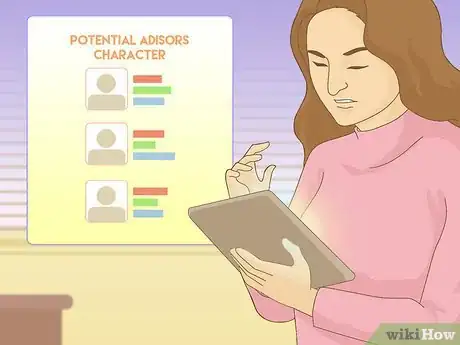This article was co-authored by Christopher Taylor, PhD. Christopher Taylor is an Adjunct Assistant Professor of English at Austin Community College in Texas. He received his PhD in English Literature and Medieval Studies from the University of Texas at Austin in 2014.
There are 7 references cited in this article, which can be found at the bottom of the page.
This article has been viewed 35,802 times.
A major part of getting a PhD is selecting an advisor. While you might choose your advisor before or after getting admitted to the program, you should always choose carefully. Find an advisor with a respectable publication history and a personality that is compatible with yours. Your advisor’s research background and interests should correspond approximately with yours. Choose wisely to avoid misery later.
Steps
Matching Your Research Interests with Possible Advisors
-
1Identify what you intend to research.[1] Ideally, you will have a specific idea, notion, or proposal ready for research before you find a PhD advisor. Use this research topic to guide you when selecting an advisor.
- If you are interested in French military history and you apply to study with a historian specializing in Chinese literature, you will probably not be accepted as a student. Even if you are accepted, your advisor will be of little use in your PhD career because they will not have the background you need to investigate and think carefully about the topic you’re interested in.
- It’s often difficult to find out what you really want to research before you’ve had at least some graduate school education. It might help if you get your Master’s degree first.
- If you are having a hard time coming up with a good research topic, make a list of less-specific topics you’re interested in, then think of ways to gradually zero in on your area of specialty. For instance, you might go from history, to U.S. history, to history of the Civil War, to the history of medical service during the Civil War. You could then look specifically for a medical historian or a Civil War historian as your advisor.
-
2Check faculty bios. Once you have at least a rough idea of what you want to research, look for a professor with knowledge of the topic. Universities offer brief biographies and CVs of staff on each department’s page. These biographies usually state what the professor’s research interests are. Check a few of these in the order to find a faculty member who has interests that align roughly with yours. Look for someone whose area of research specialization could help you develop a topic of your own.[2]
- This step is especially useful if you’re limiting yourself to a certain geographical region or a particular school (in order to, for instance, stay close to your family).
- If you’re unsure of what universities to check, look for relevant faculty positions. Do an online search for your topic followed by “PhD.” Look for professor biographies and CVs in the search results.
Advertisement -
3Contact potential advisors.[3] Send potential advisors an email to and ask if they have the experience and availability to you help you. You can even bounce some ideas off them. Introduce yourself as a PhD student (or potential PhD student, as the case may be) and indicate that you’re looking for research topics and problems in their field.
- Ask, for instance, “I was thinking about conducting research on the Roman roots of English architecture. Do you have any recommendations for books, questions, or scholars to pursue regarding this topic?”
- If the professor responds enthusiastically to your proposal, you’re in business. If they do not, they might suggest alternate topics that you might be interested in exploring.
- If possible, meet the faculty member face-to-face to ask your questions and discuss your ideas. Professors are generally happy to dispense advice.
Learning More About Potential Advisors
-
1Look more closely at individual publications.[4] Check Google Scholar (https://scholar.google.com/) and Academia (https://www.academia.edu/) for recent publications of individuals you’re interested in working with on your PhD. Alternately, you could visit a university library to access additional online academic publications or view their printed versions.
- If you aren’t enrolled at a university, you can usually access their database of scholarly publications with a guest pass.
- Don’t pretend to have read a potential advisor’s publications if you have not.
- Be sure to distinguish between actual research papers and research or book reviews. A good advisor will publish a steady stream of original research, along with some reviews as well.
-
2Contact other graduate students. Universities often list their graduate students -- both Master’s and PhD students -- on the corresponding department’s web page along with an indication as to who their advisor is. If you wish to get more information about a specific advisor, contact one of these students about their experience working with the advisor you’re considering.
- If the graduate students don’t have their email listed, you could look them up on social media and shoot them a message.
- Alternately, or in addition to the above, you could contact previous students who have gone on to an academic career of their own. Professors sometimes mention in their brief online biographies who they studied with.
- Keep in mind that students are human beings and have their own biases. An advisor that seemed impossible to one student can seem perfect for another.
-
3Evaluate each potential advisor’s character. The relationship between the PhD advisor and student is very important for student success.[5] Determine if you are looking for a laid-back advisor or someone to keep you on track. Consider if you require constructive criticism or if you are sensitive to negative feedback. Aim to find an advisor that meets your needs.
- If you’ve already met the potential advisor to discuss research topics, you could reflect on that meeting to judge their character, too.
- Meeting the potential advisor is also a good idea because it lets you find out more about the school. You can often find out only so much online. You could ask questions about the other faculty, graduate students, funding opportunities and grants, and campus life.
Making Your Decision
-
1Narrow down your list. After looking into several potential advisors, zero in on the ones you think you’d do well with. Some of this work will be done for you as you investigate professors who are retiring or not taking on new graduate students. Depending on your research area, you might have only a few choices. If you don’t like them, think about revising your research topic. However, once you’ve assembled a list of several potential advisors, weigh the pros and cons of each. Besides the factors you already considered (their area of specialty, quality of publications, and personality), you should think about the[6]
- location (Where will you have to move to?)
- expense (How expensive is your PhD tuition? Does the school offer a stipend?)
- long-term opportunities (Does the school offer research grants and funds?)
- necessary commitment (How many hours are you expected to put in? How long is the PhD expected to take?)
-
2Know what you want in an advisor. In order to select the right kind of mentor, you need to know what kind of student you are. If you are someone who is very independent and comfortable working with minimal guidance, then you would do well to choose an advisor who is generally hands-off. On the other hand, if you like getting a lot of feedback and interaction with your advisor, you might choose a junior faculty member, or pursue your PhD at a less notable university.
- Avoid judging someone’s character based off email interaction. Be sure to meet with them in person to determine if you will work well together.
- You might get more independence if you’re working with a highly esteemed professor, someone who is at the top of their field. Advisors that are well-established in a given field are usually comfortable with this kind of relationship.[7]
- Don’t select an advisor simply because they are a renowned expert in their field.
-
3Set specific expectations for your relationship with your advisor. You should expect that they credit you when presenting research projects you contributed to, or when publishing papers that you assisted with in some way. You should also expect that they will help you prepare for conferences or other talks as needed. The advisor should not pit you and another PhD student in competition with each other on the same problem or project. Finally, the advisor should help you edit your papers or thesis chapters, and encourage you to develop professionally.
- You do not need to enunciate these expectations to your advisor explicitly, but you should keep them in mind as you proceed in your PhD career.
- If your advisor does not meet your expectations, they might be thinking more of their own career than about their role as a mentor. However, it might also be a simple case of misunderstanding your needs and expectations. Academics are busy and imperfect people, like everyone else. Talk to your advisor about how you wish they would help you more in whatever area you feel they are lacking.
- If your advisor continues to fail you, you might want to look for another advisor. Don’t be afraid to switch advisors.
-
4Develop your relationship with your advisor. Take a class with your advisor to see how they explain and understand their subject. Interact with them in class by asking appropriate questions to show your interest. If possible, apply to become their research or teaching assistant.
- Always be polite and professional in conversation with your advisor.
- Schedule meetings ahead of time and call to cancel if you can’t make it.
- Solicit his or her advice on your research projects and coursework.
- During meetings pertaining to your research project, take notes.
- Know what your advisor expects of you and ask questions if you are confused or need guidance.
-
5Have a backup plan (or two) in place. Lots of things can go wrong in the relationship between you and your PhD advisor. Hold on to your narrowed-down list of potential advisors, and think about other faculty members at your university who you think might make a good advisor if things don’t work out with the advisor you selected. If you misjudged their character, or if they do not meet your expectations, do not hesitate to switch to another advisor.
- Alternately, you could think about switching from a PhD to a Master’s degree if you are too deep into your research project and just want to end it.[8]
- If your advisor becomes ill or dies, or moves on to a different university (and you are unable to follow), you might have no choice but to go with plan B.
References
- ↑ https://www.findaphd.com/advice/finding/choosing-phd-supervisor.aspx
- ↑ https://www.findaphd.com/advice/finding/choosing-phd-supervisor.aspx
- ↑ https://www.findaphd.com/advice/finding/choosing-phd-supervisor.aspx
- ↑ https://www.findaphd.com/advice/finding/choosing-phd-supervisor.aspx
- ↑ https://www.findaphd.com/advice/finding/choosing-phd-supervisor.aspx
- ↑ http://www.cc.gatech.edu/faculty/ashwin/wisdom/how-to-choose-an-advisor.html
- ↑ https://www.newscientist.com/article/mg19726442-500-the-phd-journey-how-to-choose-a-good-supervisor/
- ↑ http://www.nacada.ksu.edu/Resources/Academic-Advising-Today/View-Articles/Graduate-Advisors-are-Essential-When-Real-Life-Gets-in-the-Way.aspx



































































